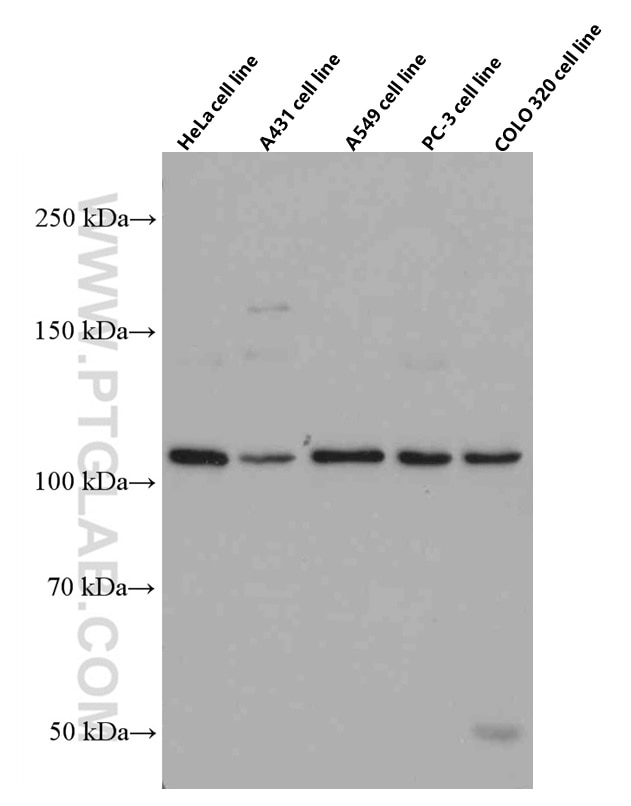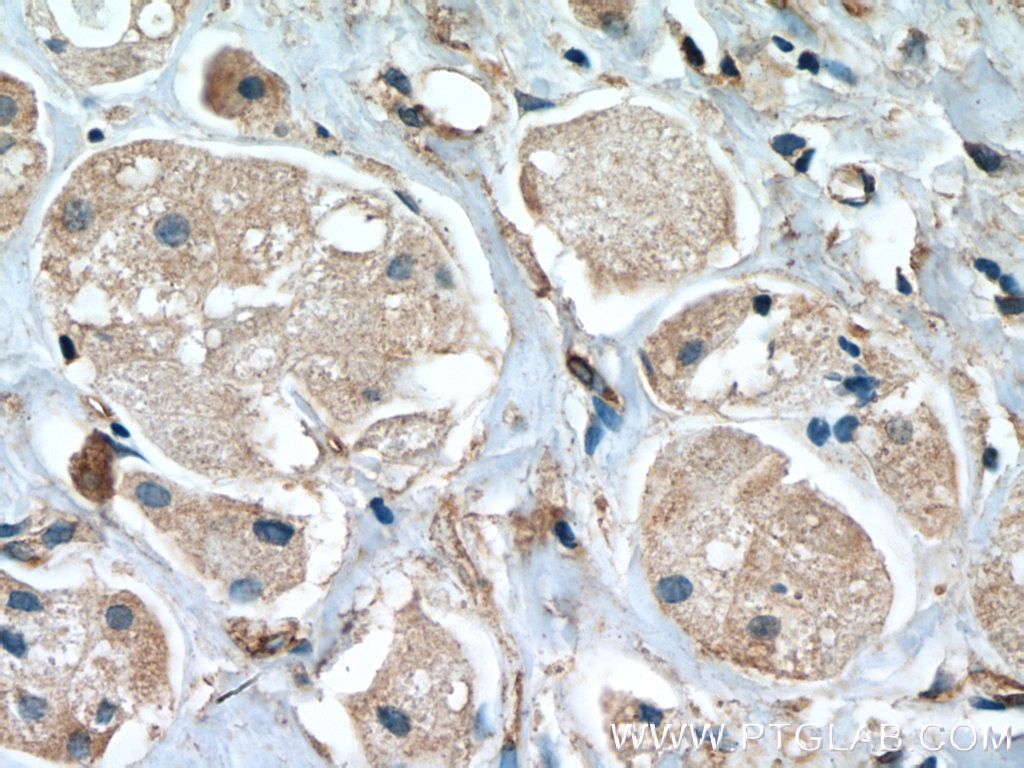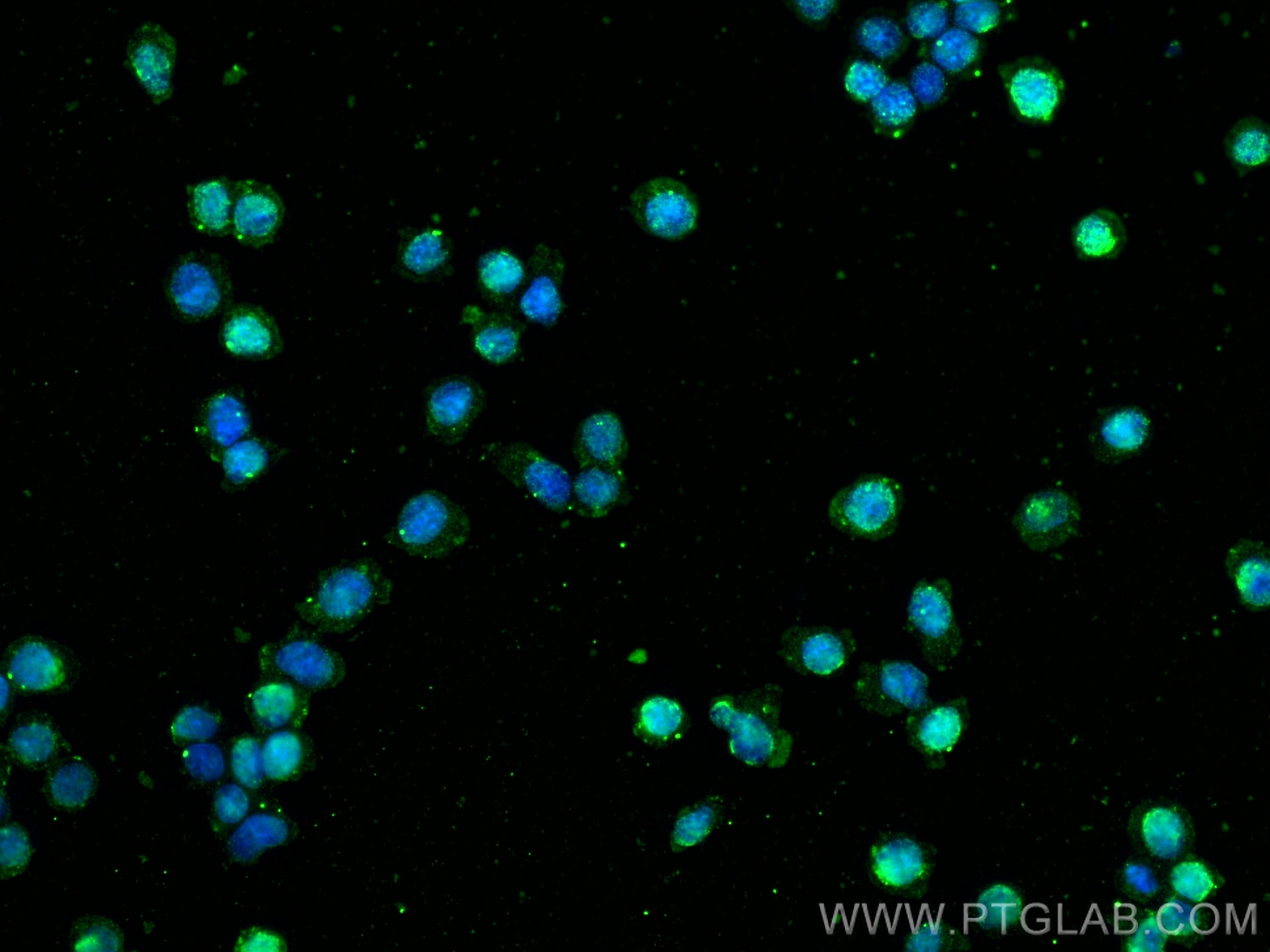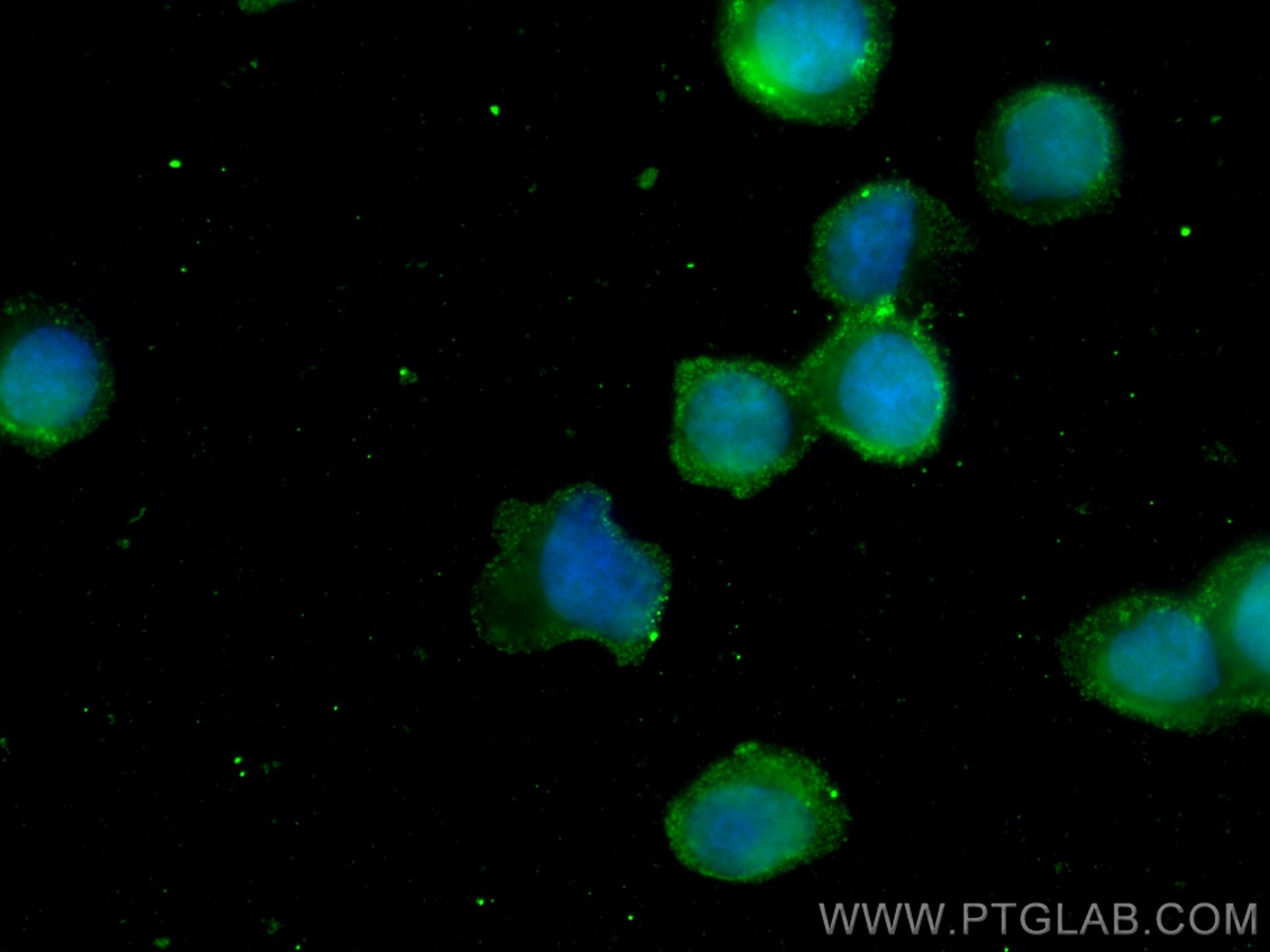STAT2 Monoklonaler Antikörper
STAT2 Monoklonal Antikörper für WB, IF, IHC, ELISA
Wirt / Isotyp
Maus / IgG1
Getestete Reaktivität
human, Maus, Ratte und mehr (1)
Anwendung
WB, IP, IF, IHC, ELISA
Konjugation
Unkonjugiert
CloneNo.
1G12C4
Kat-Nr. : 66485-1-Ig
Synonyme
Geprüfte Anwendungen
| Erfolgreiche Detektion in WB | HeLa-Zellen, A431-Zellen, A549-Zellen, COLO 320-Zellen, PC-3-Zellen |
| Erfolgreiche Detektion in IHC | humanes Mammakarzinomgewebe Hinweis: Antigendemaskierung mit TE-Puffer pH 9,0 empfohlen. (*) Wahlweise kann die Antigendemaskierung auch mit Citratpuffer pH 6,0 erfolgen. |
| Erfolgreiche Detektion in IF/ICC | Ramos-Zellen |
Empfohlene Verdünnung
| Anwendung | Verdünnung |
|---|---|
| Western Blot (WB) | WB : 1:1000-1:4000 |
| Immunhistochemie (IHC) | IHC : 1:200-1:800 |
| Immunfluoreszenz (IF)/ICC | IF/ICC : 1:400-1:1600 |
| It is recommended that this reagent should be titrated in each testing system to obtain optimal results. | |
| Sample-dependent, check data in validation data gallery | |
Veröffentlichte Anwendungen
| WB | See 4 publications below |
| IF | See 1 publications below |
| IP | See 1 publications below |
Produktinformation
66485-1-Ig bindet in WB, IP, IF, IHC, ELISA STAT2 und zeigt Reaktivität mit human, Maus, Ratten
| Getestete Reaktivität | human, Maus, Ratte |
| In Publikationen genannte Reaktivität | human, Hausschwein, Maus |
| Wirt / Isotyp | Maus / IgG1 |
| Klonalität | Monoklonal |
| Typ | Antikörper |
| Immunogen | STAT2 fusion protein Ag10168 |
| Vollständiger Name | signal transducer and activator of transcription 2, 113kDa |
| Berechnetes Molekulargewicht | 851 aa, 98 kDa |
| Beobachtetes Molekulargewicht | 113 kDa |
| GenBank-Zugangsnummer | BC051284 |
| Gene symbol | STAT2 |
| Gene ID (NCBI) | 6773 |
| Konjugation | Unkonjugiert |
| Form | Liquid |
| Reinigungsmethode | Protein-G-Reinigung |
| Lagerungspuffer | PBS with 0.02% sodium azide and 50% glycerol |
| Lagerungsbedingungen | Bei -20°C lagern. Nach dem Versand ein Jahr lang stabil Aliquotieren ist bei -20oC Lagerung nicht notwendig. 20ul Größen enthalten 0,1% BSA. |
Hintergrundinformationen
STAT2, also named as p113, belongs to the transcription factor STAT family. It is a signal transducer and activator of transcription that mediates signaling by type I IFNs (IFN-alpha and IFN-beta). Following type I IFN binding to cell surface receptors, Jak kinases (TYK2 and JAK1) are activated, leading to tyrosine phosphorylation of STAT1 and STAT2. The phosphorylated STATs dimerize and associate with ISGF3G/IRF-9 to form a complex termed ISGF3 transcription factor, that enters the nucleus. ISGF3 binds to the IFN stimulated response element (ISRE) to activate the transcription of IF stimulated genes, which drive the cell in an antiviral state. It also interacts with CRSP2, CRSP6, Simian virus 5 protein V, rabies virus phosphoprotein, IFNAR1 and IFNAR2. Its interaction with dengue virus NS5 inhibits the phosphorylation of STAT2, and, when all viral proteins are present (polyprotein), STAT2 is targeted for degradation. The calculated molecular weight of STAT2 is 98 kDa, but phosphorylated STAT2 is about 100-113 kDa.
Protokolle
| PRODUKTSPEZIFISCHE PROTOKOLLE | |
|---|---|
| WB protocol for STAT2 antibody 66485-1-Ig | Protokoll herunterladen |
| IHC protocol for STAT2 antibody 66485-1-Ig | Protokoll herunterladenl |
| IF protocol for STAT2 antibody 66485-1-Ig | Protokoll herunterladen |
| STANDARD-PROTOKOLLE | |
|---|---|
| Klicken Sie hier, um unsere Standardprotokolle anzuzeigen |
Publikationen
| Species | Application | Title |
|---|---|---|
Int Immunopharmacol Silencing SIRT1 promotes the anti-HBV action of IFN-α by regulating Pol expression and activating the JAK-STAT signaling pathway | ||
Exp Eye Res Integrated analysis of murine cornea identifies JAK/STAT signaling pathway upregulated specifically in female Vitamin A Deficient mice | ||
PLoS Pathog Free ISG15 inhibits Pseudorabies virus infection by positively regulating type I IFN signaling | ||
J Nanobiotechnology Apoptotic tumor cell-derived microparticles loading Napabucasin inhibit CSCs and synergistic immune therapy |





